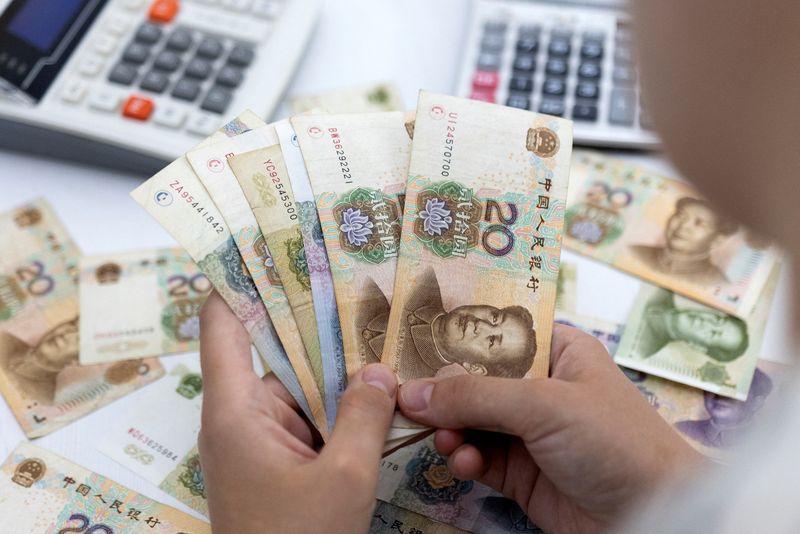By Winni Zhou and Ankur Banerjee
SHANGHAI/SINGAPORE (Reuters) -A sliding yuan and extensive outflows of cash from the mainland into Hong Kong show China's domestic investors are shelving expectations for any immediate recovery in their home markets and fleeing to the closest better-yielding assets.
The yuan has dropped to seven-month lows this week, alongside a reversal in equity investment flows into China.
Analysts said Hong Kong's stockpile of yuan deposits has also grown as mainland investors use their limited offshore investment channels to seek higher yields and companies prepare to pay annual dividends, adding to the pressure on the currency.
"Sentiment on China soured over the past month as the market has rallied ahead of improvement in macro data which continues to disappoint," said Gary Tan, a Singapore-based portfolio manager at Allspring Global Investments.
Tan, whose funds are underweight on Chinese stocks, said sentiment had come a long way from a time when mainland markets were considered "uninvestible", however, and he expected that would improve further.
But investor patience has worn thin after months of waiting for authorities to roll out more stimulus, mainly to support a sinking property sector.
The Shanghai benchmark stock index rose 20% between early February and mid-May but is down 6% since.
Foreigners who had returned to the market since February, after quitting in 2023, have turned sellers too this month, pulling out 33 billion yuan ($4.54 billion) via the northbound leg of the Stock Connect Scheme.
Domestic investors have used the southbound leg to pump 129 billion yuan into Hong Kong.
Analysts say investors have several reasons to pause and reflect, not just about how far the People's Bank of China will ease rates, but also on the approaching July plenum of China's Communist Party to shape economic and fiscal policy.
Chi Lo, senior market strategist for Asia-Pacific at BNP Paribas (OTC:BNPQY) Asset Management, said foreign funds, though now positioned neutral on Chinese stocks, are turning positive.
"Beijing is likely to keep the easing measures more progressive than they were in the 18 months, in my view, and the plenum will likely reiterate that policy direction," Lo said.
The PBOC's daily guidance for the yuan, which it manages in a tight band, is stirring speculation that the authorities are allowing some depreciation to manage the pressure.
The yuan is down 2.2% against the dollar so far this year.
PULL AND PUSH INTO HK
As mainland cash floods into Hong Kong, yuan deposits in the financial hub are at record levels, with latest official data for April showing they stand at 1.09 trillion yuan ($150 billion), close to peaks last seen in January 2022.
Ju Wang, head of Greater China currency and rates strategy at BNP Paribas, said mainland investors were thronging Hong Kong for better returns on offshore yuan, given low yields at home and expectations for further easing.
Persistent southbound flows and the traditional June-July transfers by Chinese firms to finance their dividend payments in Hong Kong had also led to selling of the offshore yuan and demand for Hong Kong dollars, she said.
Since early May, the CNH has fallen 1.9% against the Hong Kong dollar.
Also drawing money into Hong Kong is the expectation of peaking U.S. dollar rates as the Federal Reserve prepares to ease policy, which, by virtue of the Hong Kong dollar's peg, will affect its economy too.

"U.S. rate cuts are very important for Hong Kong's liquidity because of the currency peg, so once the Fed starts cutting rates, I think we will be flush with liquidity here, which will push up asset prices,” said BNP Asset Management's Lo.
($1=7.2610 Chinese yuan renminbi)